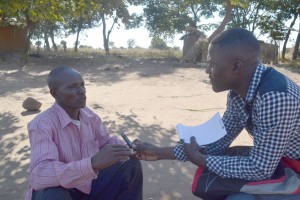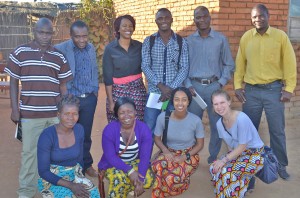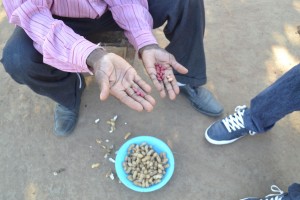
A writing workshop, a crammed car, and a sunny day in Mchinji : My visit to Malawi
It is on a bright, sunny day (two weeks ago) that I find myself crammed into the farthest back corner of the WUSC van – the car filled to the brim with four journalists, another volunteer and a driver. It is a long two-hour ride from Lilongwe to the village in Mchinji (and I might be slightly uncomfortable in the back corner), but the car is brimming with excitement.
We are all there to do what we love. This is a writing workshop to recruit for young journalists to become writers for Barza Wire – a news wire that shares stories about small-scale African farmers.
My recent trip to Malawi was an opportunity to meet with the Barza Wire Anglophone bureau chief – and to meet Lovemore, Luciano, John Paul and TK, the four participants in my writing workshop. The idea was to strengthen their writing skills and to introduce them to the challenges facing farmers so that these broadcasters might share farmer stories both over the airwaves, in print, or in Barza Wire.


 Farmers face many challenges. Some decades old – like soil fertility or marketing – others quite new and unpredictable, linked to climate change and changing weather patterns. But many are doing innovative things to overcome these challenges, from developing their own fertilizers and pesticides, to changing seed varieties or the crops they grow.
Stories of farmer innovation deserve to be highlighted in as many places as possible. Barza Wire shares them with broadcasters across Africa – and around the world. Want to know more about how farmers are adapting to climate change? Check out Barza Wire. Want to know how a farmer can ensure their soil is fertile enough to grow peppers? Hear from Jean-Pierre Milandou.
And so, in June I met Lovemore, Luciano, John Paul and TK in the boardroom of Farm Radio Trust, Farm Radio International’s partner in Malawi. Together we discussed focus statements, using the active voice, descriptive writing, and story structure. With the boring stuff out of the way, we got to work.
Once in Mchinji – and once wrapped in our colourful chitenge – we met with the village leader and four “expert” farmers, chosen by the local agricultural extension agents as the best sources for our questions on soil fertility, storage, and marketing practices. We were also interested in the impact a local radio program is having on the village.
In Malawi, tobacco is a cash crop. But these farmers also grow groundnuts (peanuts) – and that is what we are interested in. Groundnuts are highly versatile. A great source of protein as a snack, they can also be used to make butter or oil. Groundnuts are also nitrogen-fixing, meaning them help to improve the soil health – making them a great thing to intercrop with other plants, such as cassava or maize.
Sitting on a wooden chair outside the wooden home of Cosmas Chindoko, I can see the livelihoods of these farmers. A field of maize sits to the left, just beyond the soccer field that is currently occupied by a small herd of cattle, resting in the shade of a tree. In front of me, across the dirt road, is a groundnut field, and to the left of that is a tobacco field.
Sitting with me is Cosmas and his mother. They hand me a blue bowl of groundnuts – just a small portion of their harvest – and offer me some. Life here is as hard as the dry, red earth. But the sun is shining and we are having a good discussion. As I rise to leave, Cosmas has one request: another radio program or any sort of training that will further improve his harvest. Because for farmers like him, information – be it innovations or just accurate weather predictions – can make life that much better.
And that is why I am training new journalists – so that stories of farmer innovation can reach those who need it the most.
Farmers face many challenges. Some decades old – like soil fertility or marketing – others quite new and unpredictable, linked to climate change and changing weather patterns. But many are doing innovative things to overcome these challenges, from developing their own fertilizers and pesticides, to changing seed varieties or the crops they grow.
Stories of farmer innovation deserve to be highlighted in as many places as possible. Barza Wire shares them with broadcasters across Africa – and around the world. Want to know more about how farmers are adapting to climate change? Check out Barza Wire. Want to know how a farmer can ensure their soil is fertile enough to grow peppers? Hear from Jean-Pierre Milandou.
And so, in June I met Lovemore, Luciano, John Paul and TK in the boardroom of Farm Radio Trust, Farm Radio International’s partner in Malawi. Together we discussed focus statements, using the active voice, descriptive writing, and story structure. With the boring stuff out of the way, we got to work.
Once in Mchinji – and once wrapped in our colourful chitenge – we met with the village leader and four “expert” farmers, chosen by the local agricultural extension agents as the best sources for our questions on soil fertility, storage, and marketing practices. We were also interested in the impact a local radio program is having on the village.
In Malawi, tobacco is a cash crop. But these farmers also grow groundnuts (peanuts) – and that is what we are interested in. Groundnuts are highly versatile. A great source of protein as a snack, they can also be used to make butter or oil. Groundnuts are also nitrogen-fixing, meaning them help to improve the soil health – making them a great thing to intercrop with other plants, such as cassava or maize.
Sitting on a wooden chair outside the wooden home of Cosmas Chindoko, I can see the livelihoods of these farmers. A field of maize sits to the left, just beyond the soccer field that is currently occupied by a small herd of cattle, resting in the shade of a tree. In front of me, across the dirt road, is a groundnut field, and to the left of that is a tobacco field.
Sitting with me is Cosmas and his mother. They hand me a blue bowl of groundnuts – just a small portion of their harvest – and offer me some. Life here is as hard as the dry, red earth. But the sun is shining and we are having a good discussion. As I rise to leave, Cosmas has one request: another radio program or any sort of training that will further improve his harvest. Because for farmers like him, information – be it innovations or just accurate weather predictions – can make life that much better.
And that is why I am training new journalists – so that stories of farmer innovation can reach those who need it the most.


 Farmers face many challenges. Some decades old – like soil fertility or marketing – others quite new and unpredictable, linked to climate change and changing weather patterns. But many are doing innovative things to overcome these challenges, from developing their own fertilizers and pesticides, to changing seed varieties or the crops they grow.
Stories of farmer innovation deserve to be highlighted in as many places as possible. Barza Wire shares them with broadcasters across Africa – and around the world. Want to know more about how farmers are adapting to climate change? Check out Barza Wire. Want to know how a farmer can ensure their soil is fertile enough to grow peppers? Hear from Jean-Pierre Milandou.
And so, in June I met Lovemore, Luciano, John Paul and TK in the boardroom of Farm Radio Trust, Farm Radio International’s partner in Malawi. Together we discussed focus statements, using the active voice, descriptive writing, and story structure. With the boring stuff out of the way, we got to work.
Once in Mchinji – and once wrapped in our colourful chitenge – we met with the village leader and four “expert” farmers, chosen by the local agricultural extension agents as the best sources for our questions on soil fertility, storage, and marketing practices. We were also interested in the impact a local radio program is having on the village.
In Malawi, tobacco is a cash crop. But these farmers also grow groundnuts (peanuts) – and that is what we are interested in. Groundnuts are highly versatile. A great source of protein as a snack, they can also be used to make butter or oil. Groundnuts are also nitrogen-fixing, meaning them help to improve the soil health – making them a great thing to intercrop with other plants, such as cassava or maize.
Sitting on a wooden chair outside the wooden home of Cosmas Chindoko, I can see the livelihoods of these farmers. A field of maize sits to the left, just beyond the soccer field that is currently occupied by a small herd of cattle, resting in the shade of a tree. In front of me, across the dirt road, is a groundnut field, and to the left of that is a tobacco field.
Sitting with me is Cosmas and his mother. They hand me a blue bowl of groundnuts – just a small portion of their harvest – and offer me some. Life here is as hard as the dry, red earth. But the sun is shining and we are having a good discussion. As I rise to leave, Cosmas has one request: another radio program or any sort of training that will further improve his harvest. Because for farmers like him, information – be it innovations or just accurate weather predictions – can make life that much better.
And that is why I am training new journalists – so that stories of farmer innovation can reach those who need it the most.
Farmers face many challenges. Some decades old – like soil fertility or marketing – others quite new and unpredictable, linked to climate change and changing weather patterns. But many are doing innovative things to overcome these challenges, from developing their own fertilizers and pesticides, to changing seed varieties or the crops they grow.
Stories of farmer innovation deserve to be highlighted in as many places as possible. Barza Wire shares them with broadcasters across Africa – and around the world. Want to know more about how farmers are adapting to climate change? Check out Barza Wire. Want to know how a farmer can ensure their soil is fertile enough to grow peppers? Hear from Jean-Pierre Milandou.
And so, in June I met Lovemore, Luciano, John Paul and TK in the boardroom of Farm Radio Trust, Farm Radio International’s partner in Malawi. Together we discussed focus statements, using the active voice, descriptive writing, and story structure. With the boring stuff out of the way, we got to work.
Once in Mchinji – and once wrapped in our colourful chitenge – we met with the village leader and four “expert” farmers, chosen by the local agricultural extension agents as the best sources for our questions on soil fertility, storage, and marketing practices. We were also interested in the impact a local radio program is having on the village.
In Malawi, tobacco is a cash crop. But these farmers also grow groundnuts (peanuts) – and that is what we are interested in. Groundnuts are highly versatile. A great source of protein as a snack, they can also be used to make butter or oil. Groundnuts are also nitrogen-fixing, meaning them help to improve the soil health – making them a great thing to intercrop with other plants, such as cassava or maize.
Sitting on a wooden chair outside the wooden home of Cosmas Chindoko, I can see the livelihoods of these farmers. A field of maize sits to the left, just beyond the soccer field that is currently occupied by a small herd of cattle, resting in the shade of a tree. In front of me, across the dirt road, is a groundnut field, and to the left of that is a tobacco field.
Sitting with me is Cosmas and his mother. They hand me a blue bowl of groundnuts – just a small portion of their harvest – and offer me some. Life here is as hard as the dry, red earth. But the sun is shining and we are having a good discussion. As I rise to leave, Cosmas has one request: another radio program or any sort of training that will further improve his harvest. Because for farmers like him, information – be it innovations or just accurate weather predictions – can make life that much better.
And that is why I am training new journalists – so that stories of farmer innovation can reach those who need it the most.